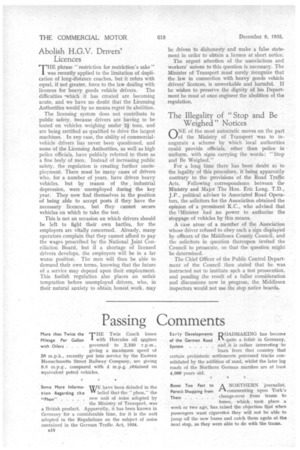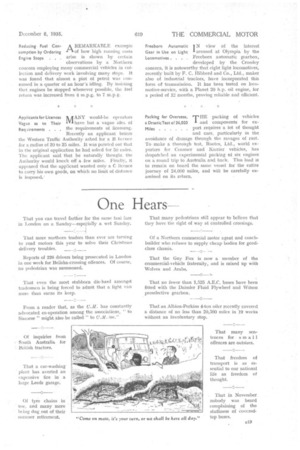Passing Comments
Page 32

Page 33

If you've noticed an error in this article please click here to report it so we can fix it.
More than Twice the HE Twin Coach buses Mileage Per Gallon I with Hercules oil exigines with Oilers . . . . governed to 2,100 r.p.m., giving a maximum speed of 38 m.p.h., recently put into service by the Eastern Massachusetts Street Railway Company, are giving 8.8 m.p.g., compared with 4 m.p.g. obtained on equivalent petrol vehicles.
Some More InformaWE have been deluded in the tion Regarding the " belief that-the " phon," the Phon " new unit of noise adopted by the Ministry of Transport, was a British product. Apparently, it has been known in Germany for a considerable time, for it is the unit adopted in the Regulations on the subject of noise contained in the German Traffic Act, 1934. el8 ROADMAKING has become N. quite a fetish in Gerniany, and it is rather interesting to learn from that country that certain prehistoric settlements possessed tracks consolidated by the addition of sand, whilst the later log roads of the Northern German marshes are at least 4,000 years old. Earl y Developments of the German Road
System
Buses Too Fast to A NORTHERN journalist, Permit Shopping from I-A commenting upon York's change-over from trams to buses, which took place a week or two ago, has raised the objection that when passengers want cigarettes they will not be able to jump off the new buses and catch them again at-the next stop, as they were able to do with the trams.
Them
Reducing Fu el Con A REMARKABLE example s um ption by Ordering .1-1 of how high running costs Engine Stops . . . arise is shown by certain
observations by a Northern concern employing many commercial vehicles in collection and delivery work involving many stops. It was found that almost a pint of petrol was consumed in a quarter of an hour's idling. By insisting that engines be stopped whenever possible, the fuel return was increased from '4 m.p.g. to 7 m.p.g.
Applicants for Licences AANY would-be operators
Vague as to Their 1111have but a vague idea of Revirements . . the -requirements of licensing.
Recently an applicant before the Western Traffic Authority asked tor a B licence for a radius of 30 to 35 miles. It was pointed out that in the original application he had asked for 50 miles. The applicant said that he naturally thought the Authority would knock off a few miles. Finally, it appeared that the app!icant wanted only a C licence to carry his own goods, on which no limit of distance is imposed.' Freeborn Automatic 1N view of the interest Gear in Use on Light I aroused at Olympia by the Locomotives . . Freeborn automatic gearbox,
developed by the Crossley concern, it is noteworthy that eight light locomotives, recently built by F. C. Hibberd and Co., Ltd., maker also of industrial .tractors, have incorporated this form of transmission. It has been tested on locomotive-service, with a Planet 20 h.p. oil engine, for a period of 12 months, proving reliable and efficient.
Packing for Overseas, THE packing of vehicles a Drastic Test of Kele and components for ex Miles port requires a lot of thought and care, particularly in the. avoidance of damage through the ravages of rust. To make a thorough test, Rooies, Ltd., world exporters for Cornmer and Karrier vehicles, has despatched an experimental packing et six engines on a round trip to Australia and. back. This load is to remain on board the same vessel for the entire journey of 24,000 miles, and will be carefully wcarnined on its return.




























































































